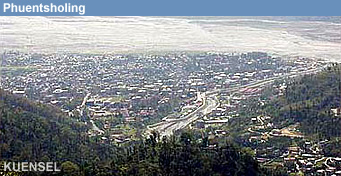| You are here: | Home > Bhutan > Topics > Economy> Phuentsholing > Settlements | Search |
 |
| Bhutan - Economy |
| Phuentsholing |
|
 |
|
|
| Increasing illegal settlements on the peripheries of Phuentsholing town |
 |
|
Authorities attribute this expansion to the acute housing crunch and exorbitant rents in core town area. Over the years they have been mushroomed around the royal guest house area, damdara, peto (bangay bazaar) and near Amochhu (toorsa) River.
 |
|
Norbu Tshering from Wanduephodrang is among the first few settlers at Bangay. A father of five and dependent on his wife said only about seven households had settled in Bangay for more than a decade.
"Over the years, many more appeared," Norbu Tshering said. "While some are genuinely those unable to pay the exorbitant rents in town, others are here to escape paying rents or to start shops."
The new dwellers, Norbu Tshering said were mostly those inheriting their parents or relatives existing businesses of bars or restaurants.
"Since it's a continuous process, I feel such settlements will continue," he said.
Another settler who runs a bar said increasing number members meant competition to their existing bar businesses and that unlicenced ones raked what licenced bars could have minted.
"In the end, it's people like us who have to pay taxes and renewal fee who suffer," he said.
He said the bars operating without licences escaped despite trade officials carrying out occasional checks.
"We're asked to lodge formal complaints but how can we do that," he said. "It's awkward because we know each other."
Norbu Tshering a private employee from Dorokha, Samtse said he had been living in Bangay bazaar since last year after his wife obtained a micro trading license and started her business there.
"We prefer running our shop in the town had it not been for the exorbitant rents and unavailability of space," he said. "But business suffering with the increasing unlicensed bars operating here."
Among them are also people who stay in the nearby places such as Kabreytar or Damdara but come only during the day to run their businesses.
|
Customers frequenting the bars and restaurants are mostly villagers who travel between Samtse and Phuentsholing via Amochu and a few customers from Phuentsholing only visit the bars.
With many school-going children at Bangay, summers are a risky period as swelling water from Amochhu touches their doorstep. |
 |
"We were told we can't live here in future," driver Harka Bhadhur said. "When we've to vacate, we will have no choice but return to our villages."
Trade officials said they carry out inspection every week where several of them are also fined and warned sternly.
While some bar and restaurant owners claim to operate with temporary licenses, trade officials said, issuance of temporary license is only done during the mandarin export at Toorsa.
"Not for Bangay or to run bars," regional trade director Kinley Wangchuk said.
The issue of housing crunch has emboldened people to build makeshift huts on government lands for low-income groups, rented out for Nu 200 and Nu 500 a month.
Phuentsholing City Corporation inspector Sonam Tenzin said they were going to remove the illegal dwellers this year.
"We'll begin with those in the core town area," he said. "Those above the royal guest house have been given a month's time to vacate."
Before the Toorsa land reclamation works begin, illegal inhabitants on its banks and bangay will also be evicted.
Sonam Tenzin said they were helpless despite being aware of people building huts on government lands to be rented out.
"It involves a lot of verification and we're working on it," he said.
Why Bangay?
Long time dwellers at Peto said the place was more popularly known as Bangay meaning tilted in Lhotshamkha.
The name derived following customers who mostly visited the place for bars and left intoxicated, barely able to stand.
Norbu Tshering said the lower part of the Bangay settlement where most bars are operating today is now being called "goptay" meaning bent in Lhotshamkha and the reason is obvious.
| Contributed by Kinga Dema, KUENSEL, Bhutan's National newspaper, 2011 |
|
|
| more information |
|
|
|
||||||||||||||||
|
 |
|
|
|
|